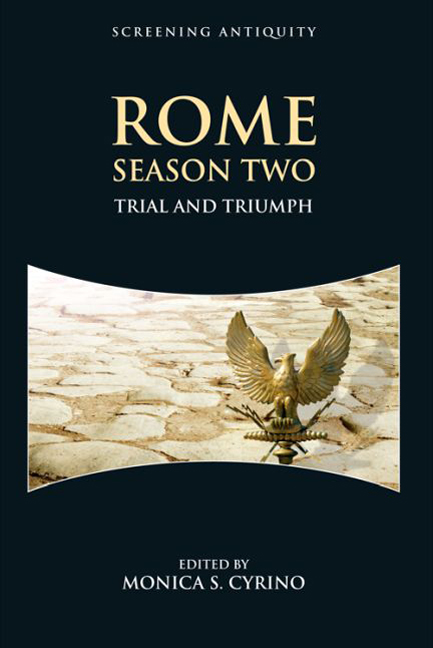Book contents
- Frontmatter
- Contents
- Series Editors’ Preface
- Editor's Acknowledgments
- Contributors
- List of Illustrations
- Episode Listing
- Cast List
- Introduction: The Trials and Triumphs of Rome, Season Two
- PART I POWER AND POLITICS
- PART II Sex and Status
- 8 Revenge and Rivalry in Rome
- 9 Effigies of Atia and Servilia: Effacing the Female Body in Rome
- 10 Livia, Sadomasochism, and the Anti-Augustan Tradition in Rome
- 11 Windows and Mirrors: Illuminating the Invisible Women of Rome
- 12 Antony and Atia: Tragic Romance in Rome
- 13 Problematic Masculinity: Antony and the Political Sphere in Rome
- 14 Rome, Shakespeare, and the Dynamics of the Cleopatra Reception
- 15 The Rattle of the Sistrum: “Othering” Cleopatra and Egypt in Rome
- 16 Gateways to Vice: Drugs and Sex in Rome
- 17 Slashing Rome: Season Two Rewritten in Online Fanfiction
- Filmography
- Bibliography
- Index
16 - Gateways to Vice: Drugs and Sex in Rome
from PART II - Sex and Status
Published online by Cambridge University Press: 07 October 2017
- Frontmatter
- Contents
- Series Editors’ Preface
- Editor's Acknowledgments
- Contributors
- List of Illustrations
- Episode Listing
- Cast List
- Introduction: The Trials and Triumphs of Rome, Season Two
- PART I POWER AND POLITICS
- PART II Sex and Status
- 8 Revenge and Rivalry in Rome
- 9 Effigies of Atia and Servilia: Effacing the Female Body in Rome
- 10 Livia, Sadomasochism, and the Anti-Augustan Tradition in Rome
- 11 Windows and Mirrors: Illuminating the Invisible Women of Rome
- 12 Antony and Atia: Tragic Romance in Rome
- 13 Problematic Masculinity: Antony and the Political Sphere in Rome
- 14 Rome, Shakespeare, and the Dynamics of the Cleopatra Reception
- 15 The Rattle of the Sistrum: “Othering” Cleopatra and Egypt in Rome
- 16 Gateways to Vice: Drugs and Sex in Rome
- 17 Slashing Rome: Season Two Rewritten in Online Fanfiction
- Filmography
- Bibliography
- Index
Summary
The ancient world as glimpsed by modern eyes has always been a sexy place, and as long as the genre has existed Hollywood has delighted in presenting antiquity as deviantly intriguing, replete with subjects and acts that in any other period would be considered scandalous or taboo. In the dimly sensuous haze of the distant past depictions of such things become somehow permissible, either by virtue of a setting that is seemingly so detached from the present, or in the name of “historical accuracy.” Such has always been the case: from the vamptastic and scantily clad Theda Bara as Cleopatra (1917) to the milk bath, gold chains, and lesbian dancing of Cecil B. DeMille's The Sign of the Cross (1932) to the homoerotic bath of Crassus in Stanley Kubrick's Spartacus (1960), antiquity has provided an ambiguously liberated outlet for exploring contemporary fascinations – regardless of their historicity. In the heady years following the post-Gladiator (2000) revival of antiquity's popularity on screens big and small we have witnessed this sexuality of the ancients intensify both in the sense of ever-more prevalent and graphic depictions of sexual acts, and the decadence blending into perversion of the acts themselves. Everything, it is safe to say, is getting more racy and risqué with each new film or series, as the cameras have been rolling on antiquity with decidedly unfiltered lenses.
This trend manifests itself in many forms, ranging from the scandalously incestuous tendencies of Commodus toward his sister Lucilla in Gladiator, to the controversial depiction of homosexuality of Oliver Stone's Alexander (2004), and the digitally enhanced pectorals and six-packs-becoming-twelve-packs of the half-naked cast of 300 (2007). The list goes on, and encompasses television series as well as films: Rome raised eyebrows with its moderately racy and fairly numerous depictions of ancient sexuality, while the cable chan nel STARZ Spartacus (2010–13) pushed the envelope further than most thought possible with graphic portrayals of hetero-, homo-, and bisexual relations (both consensual and not), whose frequency led some to brand the series quasi-pornographic. Over the past century, the ancients have not only become more sexual, but more perverse in their pleasures.
- Type
- Chapter
- Information
- Rome Season TwoTrial and Triumph, pp. 206 - 218Publisher: Edinburgh University PressPrint publication year: 2015

